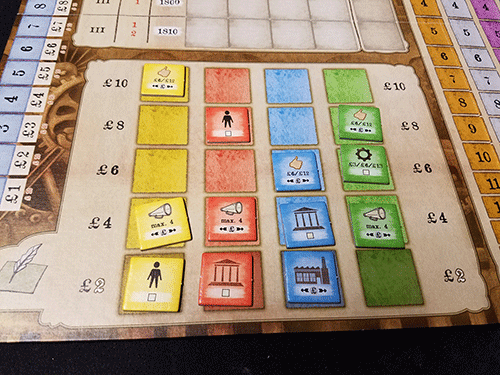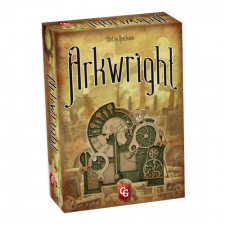Arkwright (2nd Edition) Review
on Aug 10, 2016
Be forewarned, Arkwright is not for the faint of heart. I don’t say that because you’ll be on a rollicking adventure avoiding poison darts and agents of evil; and I don’t say it because you’ll be dungeon diving and facing hideous creatures. I say it because you’ll need a keen sense of economics, capacity for long term planning, and the ability to see and take advantage of market fluctuations.
In Arkwright, the players represent businessmen from the 18th and 19th century. You can build factories for food, clothes, cutlery, or lamps. From there, you try to make the most money – sometimes by running efficiently, often by making contracts with the East India Company. But the goal isn’t just to have a stack of cash by you at the end. Instead, the game is about the interest you hold in your company. You start with 15 shares (though some must be sold to provide starting capital) and over the course of the game you want those shares to increase in value and to buy more. Only the player with the most valuable holding of shares will be crowned victor.

If the game sounds a little dry, then this may not be a title for you. Arkwright does little that facilitates the escapism that so many games can provide. But at its best, this title creates an amazing fiscal playground where every decision is measured in dollars and cents, and where you’ll have to strike a balance between cash flow and stock price.
The game comes with several play modes. The two standard types are Spinning Jenny (simple) and Waterframe (complex). Within those, there is also an array of variants. There are some hybrid versions which seek to inject Waterframe decisions into Spinning Jenny’s shorter playtime. And there is even a version where you can buy the other players’ stock. So you need to manage a full portfolio, not just your own holdings.
The game takes place over five rounds with each representing a decade of time. Each round, the players get to do one action and then one type of factory produces. Then another action and the next factory produces, and so on. To take an action, players use the action tile of their choice on an “Administrative Costs†chart. The cheapest amount is typically 2 pounds. So your actions always cost you something. And some actions need you to spend a certain amount in order to be effective.

And just because you produce goods, that doesn’t mean anyone wants to buy them. Instead, the people of England demand only a certain amount of goods. The more workers that get taken by factories, the more demand there will be. And if the players collectively produce more than England wants, only some players get to sell goods. That is determined by quality (people love quality) and price (people hate price). Goods are distributed in demand order.
Extra goods can be stored in warehouses (as long as the player has hired workers) or shipped to the East India Company to fulfill contracts. Shipping goods can net a huge windfall of cash even if your stock price falls because it’s deemed a risky venture.
Playing Arkwright is a trip. Though it’s a longer title, your head is constantly wrapped around every decision. Timing is important, as is anticipating your opponents’ actions. Perhaps you want to run just a few factories, but they will be so productive that you’ll make huge profits. Or maybe you run more factories and focus on bumping your stock price up to the extreme. Or you could even focus on shipping goods, buy up your own stock while it’s cheap, and then try to bump up the share value in the final rounds.
While there aren’t any “take that†actions, you can have a huge impact on opponents. Perhaps one player is still relying on workers and hasn’t modernized to machines. Maybe you hire a bunch of workers at the last minute and thereby increase their wages. Now his factories might be running in the red.
The one negative for Arkwright is that the Waterframe version of the game – which is basically the real version – takes quite the investment of time. A four player game can last nearly four hours. Setting aside enough to time to play and finding opponents also willing to do so can be a struggle.
As a deep economic game, this title isn’t going to appeal to everyone. And that’s ok. You’re going to have to enjoy carefully managing a fiscal empire while tactically deciding whether it makes sense to buy stock or inflate the stock price. Still, if that sounds like a good time to you, then Arkwright is definitely a title you should check out.

 Customer Support
Customer Support  Subscribe
Subscribe 




 Account
Account  Wishlist
Wishlist 

